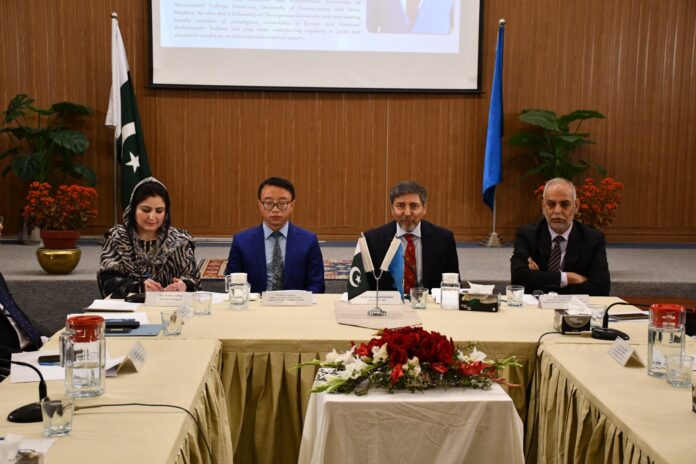- Advertisement -
ISLAMABAD, Feb 25 (APP):The Institute of Regional Studies (IRS) on Tuesday hosted a consultative dialogue on “Advancing Cooperation in the Transfer of Knowledge and Technology under the Innovation Corridor of CPEC 2.0.”
The event brought together prominent experts, scientists, high ranking Chinese officials and academics to explore opportunities for enhancing technological collaboration, joint research initiatives, and capacity building under the CPEC framework, said a press release.
In his opening remarks, Ambassador Jauhar Saleem, President of IRS, reflected on the transformative journey of CPEC marking the accomplishments of Phase 1. Emphasizing Pakistan’s potential as a connector of South, Central, East, and West Asia, he noted that Phase 2.0 shifts the focus from building on physical construction to creating an intellectual infrastructure, since advancing toward a knowledge-based society was only possible for Pakistan by leapfrogging traditional industrialization stages.
He also stressed upon the need for capitalizing on Pakistan’s young population by imparting skills and focusing on emerging technologies under CPEC.
Minister Counsellor Yang Guangyuan, emphasized the importance of B2B cooperation and digital innovation in strengthening Pakistan-China economic ties. Drawing upon two decades of experience, he highlighted improvements in business confidence acknowledging challenges such as underutilized industrial capacity and electricity overcapacity in Pakistan. While state-owned enterprises have led infrastructure development so far, he advocated for greater involvement of private Chinese companies to drive market-responsive growth.
He proposed targeted partnerships, and specialized training programs, to integrate Pakistani industries into global supply chains. Stressing the need for strategic investments in digital and applied technologies, he suggested expanding Pakistan’s 5Es policy by adding 5 more Es namely efficiency, effectiveness, electricity, endurance of policies, and e-commerce to enhance economic sustainability and competitiveness.
Dr. Asif Ali, Chairperson of the National Seed Development and Regulatory Authority (NSDRA) emphasized the need for greater collaboration in the sector given Pakistan’s status as ,primarily, an agrarian country. Noting that the Special Economic Zones (SEZs) being developed are increasingly linked to universities, he called for enhanced knowledge transfer.
Prof. Dr. Mumtaz Shah, Project Director of the China-Pakistan Joint Research Center on Earth Sciences emphasized the urgent need for adopting modern mining techniques to unlock the immense untapped potential of Pakistan’s mineral sector, which remains underdeveloped and is ripe for exploration.
Hamza Saeed Orakzai from Special Technology Zones Authority (STZA), noted that STZA has launched 18 technology zones, employing 25,000 skilled professionals. A forthcoming $300 million technology transfer investment from China was also announced, reinforcing Pakistan’s potential as a tech hub.
Khalid Taimur Akram, Executive Director, Pakistan Research Center for a Community with Shared Future,emphasized that service industry must address critical gaps between infrastructure development, technology transfer, and urged Pakistanis to invest more in language learning.
He also advocated fostering open-source private ventures, enabling Pakistan to accelerate its modernization efforts and better align with the pace of Chinese innovation.
Dr. Qamar ul Islam, Project Director Pakistan’s First Lunar Mission “ICUBE-Qamar” Institute of Space Technology,provided a compelling overview of Pakistan’s burgeoning space sector and its transformative potential. Noting that the global space economy is projected to reach $1.8 trillion by 2035, he urged Pakistan to intensify efforts in the space sector by engaging more with Chinese space tech.
Dr. Mirza Habib Ali, Director Researcher at the Pakistan Science Foundation, stated that the foundation’s strongest partnership is with China. Over the past decade, 57 joint projects have been initiated, each involving one partner from Pakistan and one from China.
Tahir Ahmed Dhindsa, Head of SDTV at the Sustainable Development Policy Institute (SDPI) and a journalist, emphasized that in today’s world success depends on controlling the narrative. While the China-Pakistan Economic Corridor (CPEC) is now an inevitable reality, its success will be shaped by the narrative built around it.

